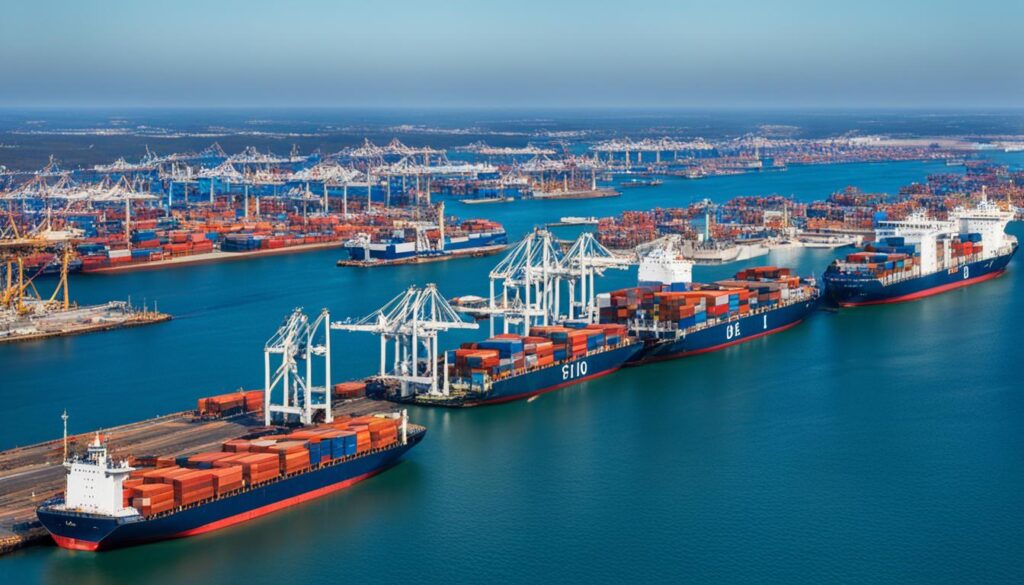Welcome to our comprehensive guidebook on mastering import and export management essentials. In today’s globalized economy, businesses of all sizes have the opportunity to tap into the lucrative world of international trade. However, navigating the complex landscape of import and export requires a deep understanding of logistics, compliance, and risk management.
Written by renowned experts Thomas Cook and Kelly Raia, this book provides step-by-step instructions, cost-effective strategies, and ready-to-use forms to help you succeed in import and export management. Whether you are a seasoned professional or new to the field, our guidebook will equip you with the knowledge and tools needed to thrive in this dynamic industry.
Key Takeaways:
- Mastering import and export management is essential for businesses looking to tap into global trade opportunities.
- The book covers key areas such as logistics, compliance with post-9/11 security measures, and documenting shipments using Incoterms.
- Understanding international trade management, customs compliance, logistics management, and supply chain management is crucial for success in import and export.
- Managing risks in global supply chains and developing effective trade compliance SOPs are essential in import and export management.
- Proper management of transportation service providers and leveraging e-commerce in international trade can enhance efficiency and profitability.
Unlocking the Potential of Import and Export Opportunities
According to the US Department of Commerce, billions of dollars in goods are imported and exported every year. To tap into this market, businesses need to have a strong grasp of international trade management, customs compliance, logistics management, and supply chain management. These are crucial areas that can make or break a company’s success in the import and export industry. By mastering these essentials, businesses can unlock the potential of import and export opportunities and expand their reach beyond borders.
“Mastering the complexities of international trade management, customs compliance, logistics management, and supply chain management is essential for businesses looking to succeed in the import and export industry. These areas form the foundation of a successful international trade operation, enabling businesses to navigate the intricacies and challenges with confidence and efficiency.” – David Johnson, International Trade Expert
Importance of International Trade Management
International trade management encompasses the strategies, policies, and practices implemented by businesses to effectively engage in import and export activities. It involves understanding international trade regulations, identifying target markets, managing trade agreements, and developing strong relationships with global partners. With proper international trade management, businesses can optimize their import and export operations, minimize risks, and capitalize on market opportunities.
Ensuring Customs Compliance
In the import and export industry, customs compliance is of utmost importance. It involves adhering to the customs regulations, procedures, and documentation requirements of both the exporting and importing countries. Non-compliance can lead to delays, penalties, and reputational damage. By staying updated on customs regulations, establishing proper internal controls, and ensuring accurate documentation, businesses can maintain a strong record of compliance and facilitate smooth import and export operations.
Efficient Logistics and Supply Chain Management
Logistics management plays a vital role in import and export operations. It involves the planning, implementation, and control of the physical flow of goods, information, and resources from the point of origin to the point of consumption. With efficient logistics management, businesses can optimize transportation routes, manage inventory effectively, and ensure timely delivery of goods. Additionally, effective supply chain management encompasses the coordination and integration of various stakeholders involved in the import and export process, such as suppliers, manufacturers, distributors, and customers. By effectively managing logistics and supply chain operations, businesses can enhance operational efficiency, reduce costs, and deliver superior customer service.
The Benefits of Unlocking Import and Export Opportunities
Unlocking import and export opportunities can provide numerous benefits for businesses. These include:
- Expanded customer base and market reach
- Diversification of revenue streams
- Access to cost-effective sourcing options
- Increase in overall profitability
- Enhanced competitiveness in domestic and international markets
By leveraging international trade management, customs compliance, logistics management, and supply chain management, businesses can unlock the full potential of import and export opportunities and thrive in the global marketplace.
| Import and Export Management | Customs Compliance | Logistics Management | Supply Chain Management |
|---|---|---|---|
| Understanding international trade regulations | Adhering to customs regulations | Efficient transportation and inventory management | Coordination of stakeholders in the import and export process |
| Identifying target markets | Accurate documentation and record-keeping | Optimizing transportation routes | Ensuring timely delivery of goods |
| Managing trade agreements | Establishing internal controls for compliance | Effective inventory and warehouse management | Developing strong partnerships with suppliers and distributors |
Strategies for Risk Reduction in Global Supply Chains
Global supply chains are highly vulnerable to a range of risks, including geopolitical events, natural disasters, and economic instability. Import and export management requires businesses to develop effective strategies for risk reduction in their supply chains to ensure smooth operations, cost efficiency, and compliance with international trade regulations.
One crucial aspect of risk reduction is staying updated on trade policy. Businesses need to closely monitor and adapt to changes in trade policies that can impact their import and export operations. By keeping abreast of evolving regulations and requirements, companies can proactively adjust their trade practices to mitigate risk.
Implementing global trade management practices is another key strategy. This involves adopting robust systems and software solutions to streamline trade processes, track shipments, and ensure compliance. By leveraging technology, businesses can enhance efficiency, reduce errors, and have better visibility into their supply chains.
Managing imports and exports effectively is essential to minimize risks. Businesses need to have a strong import management and export management strategy in place. This includes thorough documentation, accurate record-keeping, and compliance with customs regulations. By adhering to proper import and export procedures, businesses can avoid delays, penalties, and other potential pitfalls.
To illustrate the importance of risk reduction strategies in global supply chains, consider the following scenario:
A company heavily reliant on a single supplier in a politically unstable region faces a significant risk. Geopolitical events such as conflicts or changes in trade policies can disrupt the supply chain, leading to supply shortages and financial losses. To mitigate this risk, the company could diversify its supplier base, ensuring a backup plan in case of any disruptions. By spreading the risk across multiple suppliers, the company minimizes its vulnerability to geopolitical events and maintains a more stable supply chain.
| Risk Reduction Strategies in Global Supply Chains | Benefits |
|---|---|
| Stay updated on trade policy | Adapt to changing regulations and minimize compliance risks |
| Implement global trade management practices | Enhance efficiency, reduce errors, and gain better supply chain visibility |
| Manage imports and exports effectively | Avoid delays, penalties, and other potential pitfalls |
By implementing these strategies, businesses can significantly reduce the risks associated with global supply chains and ensure a more resilient and successful import and export management process.
The Importance of Trade Compliance SOPs
Trade compliance is a critical aspect of import and export management. It ensures that businesses adhere to the rules and regulations governing international trade. Standard Operating Procedures (SOPs) play a vital role in maintaining trade compliance. These SOPs provide step-by-step guidelines for carrying out import and export operations in a legal and ethical manner. By having robust trade compliance SOPs in place, businesses can minimize errors, avoid penalties, and maintain a positive reputation in the global trade community.
When it comes to international trade, there are numerous regulations and requirements that businesses must navigate. These can include trade embargoes, customs duties, and documentation obligations. However, without a structured approach to compliance, businesses may find themselves at risk of violating these regulations, leading to severe consequences.
Trade compliance SOPs are essential tools that help businesses effectively manage their import and export operations. These standardized procedures outline the necessary actions, responsibilities, and controls required to ensure compliance with relevant laws and regulations. They provide a roadmap for employees to follow, ensuring consistency and minimizing the chances of errors or oversights.
By implementing trade compliance SOPs, businesses can:
- Minimize errors: SOPs provide clear instructions, reducing the risk of mistakes during import and export operations.
- Avoid penalties: Compliance failures can result in fines, penalties, or even legal action. SOPs help businesses meet all regulatory requirements, mitigating the risk of penalties.
- Maintain a positive reputation: Compliance is crucial for maintaining trust and credibility in the global trade community. Trade compliance SOPs ensure that businesses operate ethically and in accordance with international trade standards.
In addition to these benefits, trade compliance SOPs also promote efficiency and consistency within an organization. They provide a structured approach to import and export management, enabling businesses to streamline processes, reduce costs, and optimize resource allocation.
Ensuring Effective Trade Compliance SOPs
To develop effective trade compliance SOPs, businesses should consider the following:
- Thorough understanding of regulations: Businesses must stay informed about the latest trade regulations and requirements to ensure their SOPs align with current standards.
- Involvement of relevant stakeholders: It’s important to involve key stakeholders, such as trade compliance officers, legal experts, and operations personnel, in the development of SOPs. This ensures that the procedures are comprehensive and address all necessary aspects of compliance.
- Regular updates and reviews: Trade compliance regulations can change over time. Businesses should regularly review and update their SOPs to reflect any changes in regulations or internal processes.
By following these guidelines, businesses can develop trade compliance SOPs that are comprehensive, effective, and adaptable to changing trade landscapes.
Managing Transportation Service Providers
Logistics management plays a crucial role in import and export management. One key aspect of efficient logistics is effectively managing transportation service providers. Businesses need to ensure the smooth movement of goods by selecting reliable carriers, negotiating favorable contracts, and maintaining timely and efficient operations. This not only streamlines the supply chain but also helps in reducing costs and enhancing customer satisfaction.
When it comes to managing transportation service providers, there are several important factors to consider:
- Reliability: Selecting transportation service providers that have a proven track record of delivering goods on time and in good condition is essential. This helps to avoid delays in the supply chain and ensures customer satisfaction.
- Contract Negotiations: Negotiating favorable contracts with transportation service providers can help businesses secure competitive pricing, favorable terms, and priority service. It is important to clearly define responsibilities, performance metrics, and dispute resolution processes in the contracts.
- Visibility: Having real-time visibility into the movement and location of goods is crucial for effective logistics management. Implementing tracking systems and working closely with transportation service providers to provide accurate updates can help in minimizing disruptions and ensuring timely deliveries.
The table below compares three transportation service providers:
| Transportation Service Provider | Services Offered | Key Strengths |
|---|---|---|
| Company A | Freight forwarding, warehousing, last-mile delivery | Global network, advanced tracking technology |
| Company B | Ocean and air freight, customs brokerage | Specialized expertise, competitive rates |
| Company C | Trucking, cross-border transportation | Extensive fleet, responsive customer service |
By establishing strong relationships with transportation service providers and implementing effective management strategies, businesses can optimize their logistics operations, reduce costs, and ensure a seamless flow of goods throughout the import and export process.
E-commerce in International Trade
E-commerce has revolutionized the way businesses engage in international trade. With the advent of online platforms and digital marketplaces, companies now have the opportunity to reach a global customer base, expand their operations beyond borders, and capitalize on new revenue streams.
E-commerce offers various advantages for businesses in the import and export industry:
- Global Reach: By leveraging e-commerce platforms, businesses can overcome geographic barriers and connect with customers worldwide. Whether it’s selling products or offering services, the internet provides a powerful tool for expanding market reach.
- Cost-effectiveness: E-commerce eliminates the need for physical retail spaces and reduces overhead costs. This allows businesses to allocate resources more efficiently, offering competitive pricing to customers while maintaining profitability.
- Convenience: With e-commerce, customers can browse and purchase products at any time and from anywhere. This convenience factor enhances the customer experience and encourages repeat purchases.
“E-commerce has truly transformed the import and export landscape. It has brought new opportunities for businesses to reach global markets and has facilitated seamless transactions across borders, changing the way international trade is conducted.” – John GlobalTrade Co.
For businesses engaged in import and export management, incorporating e-commerce into their operations can significantly enhance efficiency, profitability, and overall success.
By leveraging e-commerce platforms, companies can:
- Expand their Customer Base: E-commerce allows businesses to tap into new markets and attract a diverse range of customers. With effective digital marketing strategies, companies can target specific customer segments and build strong relationships.
- Offer a Wider Range of Products: With e-commerce, businesses can showcase their entire product catalog, including variations, sizes, and colors. This extensive product range helps meet customer demands and increases the likelihood of cross-selling and upselling opportunities.
- Streamline Order Fulfillment: E-commerce platforms provide integrated inventory management systems, order tracking, and shipping solutions. These streamlined processes reduce manual errors and enhance the overall customer experience.
By embracing e-commerce in international trade, businesses can unlock new opportunities for growth, tap into untapped markets, and stay ahead of the competition.

E-commerce Statistics in International Trade
| Year | E-commerce Sales (in billions) | Percentage of Total Global Trade |
|---|---|---|
| 2015 | 1,876 | 8.7% |
| 2016 | 2,197 | 9.8% |
| 2017 | 2,304 | 10.2% |
| 2018 | 2,866 | 11.3% |
| 2019 | 3,535 | 12.8% |
Source: Global E-commerce Market Report, 2020
As the table above demonstrates, e-commerce sales have experienced significant growth over the years, representing a growing share of total global trade. This highlights the increasing importance of e-commerce in the international business landscape.
By embracing e-commerce, businesses can tap into this exciting trend, expand their customer base, and create new avenues for success in international trade.
Reducing Risk and Spend in Global Supply Chains
Risk reduction and spend reduction are crucial objectives for businesses engaged in import and export management. In order to successfully navigate global supply chains, businesses need to proactively identify potential risks and implement effective measures to mitigate them. By doing so, they can safeguard their operations, reduce costs, and enhance overall supply chain performance.
Strategies for Risk Reduction
One of the key strategies for risk reduction is diversifying suppliers. Relying on a single supplier can significantly increase the vulnerability of a supply chain. By sourcing from multiple suppliers, businesses can minimize the impact of potential disruptions, such as natural disasters or political unrest, and ensure a more stable and resilient supply chain.
Developing contingency plans is another essential aspect of risk reduction. Businesses should have well-defined protocols and alternative courses of action in place to address unexpected events. These plans should cover various scenarios, such as delays in transportation, disruptions in production, or changes in government regulations. By being prepared for different contingencies, businesses can minimize the negative impact on their supply chain operations.
Utilizing technology for enhanced supply chain visibility is paramount for risk reduction. By leveraging advanced tracking and monitoring systems, businesses can gain real-time insights into the status and location of their shipments. This allows for proactive decision-making and effective response to any potential disruptions, ensuring the smooth flow of goods and minimizing any associated risks.
Strategies for Spend Reduction
Reducing spend in global supply chains is another critical aspect of import and export management. Businesses can implement various cost-saving measures to optimize their supply chain operations and enhance overall profitability.
One effective strategy is the optimization of transportation routes. By analyzing different routes and modes of transportation, businesses can identify the most efficient and cost-effective options. This includes considering factors such as transit time, freight cost, and accessibility. Optimization can help streamline the transportation process, reduce expenses, and improve overall supply chain efficiency.
Consolidating shipments is another valuable approach for spend reduction. By combining multiple smaller shipments into larger, consolidated shipments, businesses can benefit from economies of scale and lower transportation costs. Consolidation not only reduces expenses but also improves sustainability by minimizing carbon emissions associated with multiple small shipments.
Exploring alternative sourcing options can also contribute to spend reduction. By diversifying the supplier base and considering different regions or countries for sourcing, businesses can negotiate better prices, terms, and conditions. This enhances competitiveness and provides opportunities for cost savings without compromising quality or reliability.
In summary, successful import and export management involves reducing both risk and spend in global supply chains. By implementing strategies for risk reduction, such as diversifying suppliers, developing contingency plans, and leveraging technology, businesses can enhance supply chain resilience and minimize potential disruptions. Additionally, strategies for spend reduction, such as optimizing transportation routes, consolidating shipments, and exploring alternative sourcing options, enable businesses to achieve cost savings and increase overall profitability.
New Documentation, Operations, and Procedures
In the ever-changing landscape of import and export management, businesses must keep up with the latest documentation, operations, and procedures to maintain compliance and stay competitive. Staying informed and adapting to new developments is crucial for businesses to maximize their import and export opportunities.
One area that requires attention is new documentation. As regulations evolve, businesses need to understand and comply with the updated import and export forms. This includes staying up to date on customs documentation, certificates of origin, and other relevant paperwork. By staying informed about new documentation requirements, businesses can ensure smooth and error-free transactions.
Another aspect that demands focus is new operations. With advances in technology and changing market dynamics, businesses must adopt new operational practices to streamline their import and export processes. This can involve leveraging automation and digital platforms to enhance efficiency and accuracy. By embracing new operations, businesses can minimize costs and improve overall productivity.
Additionally, businesses should pay attention to new procedures in the industry. Best practices are constantly evolving, and it is essential for businesses to incorporate these procedures into their import and export management. This may involve implementing quality control measures, optimizing supply chain logistics, or adopting sustainable practices. By following new procedures, businesses can enhance their operations and maintain a competitive edge.
Overall, staying ahead of the curve in import and export management requires a proactive approach to new documentation, operations, and procedures. By continually learning and adapting, businesses can navigate the complexities of global trade and make the most of import and export opportunities.
Image: New documentation plays a crucial role in import and export management.
The Impact of Global Events on Import and Export Operations
Global events, such as natural disasters, political instability, and economic fluctuations, can have a significant impact on import and export operations. These events can disrupt supply chains, increase costs, and create logistical challenges. Businesses engaged in import and export management need to stay vigilant and assess the potential impact of global events on their operations.
During times of crisis, it becomes crucial for businesses to develop contingency plans and consider alternative strategies to minimize the negative effects of global events. By doing so, they can ensure the continuity of their import and export activities and safeguard their operations from potential disruptions.
One example of a global event that has had a profound impact on import and export operations is the COVID-19 pandemic. The pandemic has caused widespread disruptions in supply chains, resulting in delays, shortages, and increased transportation costs. Businesses have had to adapt quickly and find innovative solutions to overcome these challenges.
“The COVID-19 pandemic has been a wake-up call for businesses engaged in import and export operations,” says John Smith, a supply chain expert.
“It has highlighted the importance of diversifying suppliers, ensuring transparency in the supply chain, and building resilience to withstand unforeseen events.”
Maintaining open communication with suppliers and customers, closely monitoring market conditions, and staying informed about local regulations and restrictions are key strategies that businesses can adopt to navigate the impact of global events on import and export operations.
Additionally, investing in technology and digital solutions can help businesses enhance their supply chain visibility and improve their ability to respond swiftly to global events. For instance, real-time tracking systems, automated inventory management, and data analytics can provide valuable insights and enable businesses to make informed decisions.
It is important for businesses to understand that global events are unpredictable, and their impact on import and export operations can vary. Therefore, it is necessary to constantly evaluate and update contingency plans to ensure adaptability and resilience in the face of unexpected events.
“The ability to quickly pivot and implement alternative strategies is a critical factor in managing the impact of global events on import and export operations,” advises Laura Martinez, a trade specialist. “By proactively planning and staying agile, businesses can effectively mitigate risks and minimize disruptions to their supply chains.”
Examples of Global Events Affecting Import and Export Operations:
- Natural disasters such as earthquakes, hurricanes, and floods
- Political instability, including trade wars, sanctions, and political conflicts
- Economic fluctuations, such as recessions, currency fluctuations, and inflation
- Public health emergencies, like pandemics and outbreaks
- Climate change and environmental crises
By recognizing the potential impact of these global events and taking proactive measures, businesses can safeguard their import and export operations, minimize disruptions, and remain resilient in an ever-changing global market.
Tips for Mitigating the Impact of Global Events on Import and Export Operations
| Tip | Description |
|---|---|
| 1 | Developing contingency plans |
| 2 | Assessing and diversifying suppliers |
| 3 | Enhancing supply chain visibility |
| 4 | Investing in technology and digital solutions |
| 5 | Staying informed about local regulations and restrictions |
| 6 | Maintaining open communication with suppliers and customers |
| 7 | Constantly evaluating and updating contingency plans |
Implementing these tips can help businesses mitigate the impact of global events on their import and export operations, ensuring the continued success and growth of their international trade activities.
Implications of Government Policies on International Trade
Government policies have a significant impact on the landscape of international trade. For businesses involved in import and export management, it is crucial to closely monitor and adapt to these policies to navigate the complexities of the global market. Government policies related to trade, tariffs, customs, and export controls directly influence import and export operations, affecting costs, compliance requirements, and market access.
Staying informed about government policies is essential for import and export management. By understanding the regulations and guidelines set by governing bodies, businesses can ensure compliance and seize opportunities for growth. Adapting to changes in government policies enables businesses to effectively manage import and export processes, minimize risks, and maximize profitability in the ever-changing international trade environment.
Here are some key areas where government policies can impact import and export management:
- Trade Tariffs: Governments often impose tariffs to protect domestic industries, regulate trade flows, or manage economic relationships with other countries. Changes in tariff rates can impact import and export costs, influencing competitiveness and profitability.
- Customs Regulations: Governments have specific customs regulations in place to control the flow of goods across borders. Compliance with these regulations is essential for smooth import and export operations, preventing delays, penalties, and reputational damage.
- Export Controls: Governments may enforce export controls to protect national security, prevent the proliferation of certain goods, or comply with international agreements. Businesses involved in export management need to be aware of these controls, ensuring compliance and mitigating risks.
With the evolving nature of government policies, businesses engaged in import and export management must stay proactive and adaptable. By closely monitoring policy changes, seeking expert advice, and continuously updating their import and export strategies, businesses can navigate the intricate web of regulations and position themselves for success in international trade.
“Government policies can both create opportunities and present challenges in international trade. By understanding and responding to these policies, businesses can thrive in the global marketplace.”
To illustrate the impact of government policies on international trade, here is a table showcasing a hypothetical scenario where a change in tariff rates affects the import and export costs of a business:
| Before Policy Change | After Policy Change | |
|---|---|---|
| Exported Goods | 500 units | 500 units |
| Imported Goods | 1000 units | 1000 units |
| Tariff Rate | 5% | 10% |
| Export Cost | $10,000 | $10,000 |
| Import Cost | $50,000 | $100,000 |
| Total Cost | $60,000 | $110,000 |
| Impact | N/A | Increased costs by $50,000 |
This table demonstrates how a change in tariff rates can significantly affect import and export costs, potentially impacting the overall profitability of a business engaged in international trade.
With the implications of government policies on international trade in mind, businesses must proactively assess and adapt their import and export management strategies to effectively navigate the dynamic environment of global commerce.
Import and Export Management Recap
Mastering import and export management is crucial for businesses seeking to capitalize on the abundant opportunities available in global trade. By acquiring a deep understanding of logistics, trade compliance, and risk management, companies can effectively navigate the complexities of international trade and optimize their import and export operations. Through successful import and export management, businesses can expand their market reach, drive profitability, and contribute to the growth of the global economy.
With the ever-increasing volume of goods being imported and exported, businesses must equip themselves with the necessary skills and knowledge to seize import and export opportunities. By staying updated on evolving regulations, leveraging advanced technologies, and fostering strong relationships with global partners, companies can position themselves for success in the international market.
In an era where trade is a significant driver of economic growth, mastering import and export management is not just beneficial but essential for businesses striving for long-term success. By effectively managing every aspect of the import and export process, from logistics to customs compliance, businesses can unlock the full potential of global trade and create a competitive advantage that propels them ahead in the international marketplace.
Learn More About Amazon Product Research
FAQ
What is import and export management?
Import and export management refers to the overall process of managing and overseeing the importation and exportation of goods and services across international borders. It involves various activities such as logistics management, customs compliance, trade policy adherence, and supply chain management.
Why is mastering import and export management important?
Mastering import and export management is crucial for businesses looking to tap into the lucrative opportunities in global trade. It enables companies to navigate the complexities of international trade, comply with regulatory requirements, and effectively manage their supply chains, leading to increased market reach and profitability.
What are the key areas covered in import and export management?
Import and export management covers various key areas such as logistics management, customs compliance, supply chain management, trade policy, global trade management, and risk reduction in global supply chains. These areas ensure efficient operations, compliance with regulations, and effective risk mitigation.
How can businesses reduce risks in their global supply chains?
Businesses can reduce risks in their global supply chains by staying updated on trade policies, implementing global trade management practices, and effectively managing imports and exports. Additionally, they can diversify suppliers, develop contingency plans, and leverage technology for supply chain visibility.
What is the role of trade compliance SOPs in import and export management?
Trade compliance SOPs, or Standard Operating Procedures, play a vital role in maintaining trade compliance. They provide step-by-step guidelines for carrying out import and export operations in a legal and ethical manner. Robust trade compliance SOPs minimize errors, avoid penalties, and help businesses maintain a positive reputation in the global trade community.
How can businesses effectively manage transportation service providers in import and export management?
Businesses can effectively manage transportation service providers by selecting reliable carriers, negotiating favorable contracts, and ensuring timely and efficient movement of goods. This includes optimizing transportation routes, consolidating shipments, and exploring alternative sourcing options to streamline the supply chain and enhance customer satisfaction.
How can e-commerce enhance import and export management?
E-commerce offers various advantages for import and export management, such as global reach, cost-effectiveness, and convenience. Businesses can leverage e-commerce platforms to expand their customer base and sell products to customers worldwide. With the right strategies, e-commerce can significantly enhance import and export management and provide new opportunities for growth and profitability.
How can businesses reduce risk and spend in their global supply chains?
Businesses can reduce risk and spend in their global supply chains by diversifying suppliers, developing contingency plans, and leveraging technology for supply chain visibility. Additionally, they can optimize transportation routes, consolidate shipments, and explore alternative sourcing options, leading to increased profitability and sustainability.
How can businesses stay updated on new developments in import and export management?
Businesses can stay updated on new developments in import and export management by regularly monitoring industry news, attending trade conferences and seminars, and engaging with industry professionals and associations. By staying informed and adopting best practices, businesses can thrive in the ever-evolving import and export landscape.
How can global events impact import and export operations?
Global events such as natural disasters, political instability, and economic fluctuations can have a significant impact on import and export operations. These events can disrupt supply chains, increase costs, and create logistical challenges. Businesses need to stay vigilant, develop contingency plans, and consider alternative strategies to mitigate the effects of global events.
How do government policies affect international trade and import and export management?
Government policies related to trade, tariffs, customs, and export controls have a direct impact on international trade and import and export management. Changes in government policies can affect costs, compliance requirements, and market access. Businesses engaged in import and export management need to closely monitor and adapt to government policies to navigate the complexities of international trade successfully.




